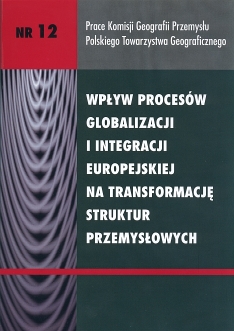Przestrzenna dyfuzja technologii informacyjno-komunikacyjnych (na przykładzie rozprzestrzeniania się kodu kreskowego w województwie wielkopolskim)
DOI:
https://doi.org/10.24917/20801653.12.9Słowa kluczowe:
dyfuzja, IT, kod kreskowy, wielkopolskieAbstrakt
With advances of globalisation at the close of the 20th century, economic development started to rely more and more heavily on innovation in information and communication technologies (ICT). Through progress in this field, there appeared new possibilities of communicating, and acquiring and processing information. The application and practical use of information and communication technologies began to determine the competitiveness of businesses, regions, and states.Most of the works on the growing role of ICT in the economy published to date have employed an approach developed within economic sciences; they have largely been analyses of a dynamic nature. The spatial aspect has often been ignored. The concept that fills the gap is the theory of the spatial diffusion of innovation employed in the geographical sciences. The present article seeks to reconstruct the spatial diffusion of ICT in the enterprises of Wielkopolska voivodeship, using the EAN bar code in the years 1990-2002 as an example. The analysis showed the mechanism of ICT spread and provided a basis for a typology of communes by the rate of adoption of this type of technology. In this way, areas were identified in which innovation appears in the initial period of the spatial diffusion process, i.e. the most innovative ones, and those where innovation appears at a later time, i.e. lagging behind.Downloads
Metrics
Bibliografia
Brown L.A., 1968, Diffusion processes and location. A conceptual framework and bibliography,Regional Science Research Institute, Bibliography, series 4, Philadelphia
Dramowicz K., 1977, Symulacja w analizie przestrzennej, „Przegląd Zagranicznej Literatury Geograficznej”, 2
Friedmann J. R., 1967, A general theory of polarized development, [w:] N.M. Hansen, red., Growth centers in regional economic development, New York
Gould P. R., 1969, Spatial diffusion, Washington: Association of American Geographers, 4
Gould P.R., Huang I.C., 1974, Diffusion in an urban hierarchy: the case of rotary clubs, „Economic Geography”, 50, 4, 333–340
Hägerstrand T.,1967, Innovation diffusion as a spatial process, The University of Chicago Press, Chicago, London
Hałas E., 2000, Kody kreskowe, Biblioteka logistyka, Poznań
Hudson J., 1972, Geographical diffusion theory, Studies in Geography, 19 Department of Geography, Northwestern University, Evanston, Illinois
Instytu Logistyki i Magazynowania, 2003, Kod kreskowy, ILiM, Poznań (materiały niepublikowane)
Kamiński Z., 1982, Przestrzenna dyfuzja innowacji rolniczych, Wyd. Naukowe UAM, Poznań
Kosmacz-Chodorowska A., 2000, Więcej wiesz – działasz lepiej, „Logistyka” 1
Łoboda J., 1973, Rozwój telewizji w Polsce, Acta Universitatis Wratislaviensis, 191, Studia Geograficzne, 19
Łoboda J., 1973, Rozwój telewizji w Polsce. Acta Universitatis Wratislaviensis, 191, Studia Geograficzne, 19
Łoboda J., 1983, Rozwój koncepcji i modeli przestrzennej dyfuzji innowacji, Acta Universitatis Wratislaviensis, 585, Studia Geograficzne, 37
Morill R., 1968, Waves of spatial diffusion, „Journal of Regional Science” 8
Narodowy Plan Rozwoju, Akty prawne i materiały robocze, styczeń 2005, Ministerstwo Gospodarki i Pracy, Warszawa
Rogers E.M., 1962, Diffusion of innovations, The Free Press of Glencoe, New York
Stryjakiewicz T., red., 2004, Wpływ inwestorów zagranicznych na rozwój regionalny i lokalny na przykładzie GlaxoSmithKline Pharmaceuticals S.A., Bogucki Wydawnictwo Naukowe, Poznań
Weltrowska J., 2003, Rozwój systemu bankowego w Polsce w latach 1989–2002, Bogucki Wydawnictwo Naukowe, Poznań
Werner P., 2003, Geograficzne uwarunkowania rozwoju infrastruktury społeczeństwa informacyjnego w Polsce, Uniwersytet Warszawski, Wydział Geografii i Studiów Regionalnych, Warszawa
Pobrania
Opublikowane
Jak cytować
Numer
Dział
Licencja
Artykuły publikowane są zgodnie z warunkami licencji Creative Commons (CC BY-ND 4.0; uznanie autorstwa-bez utworów zależnych).

